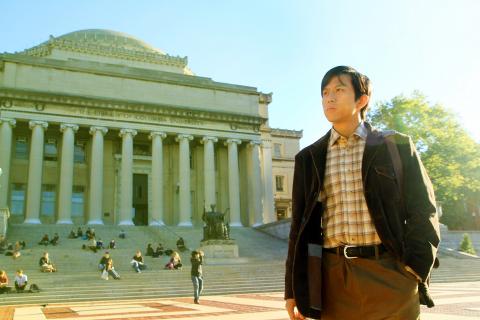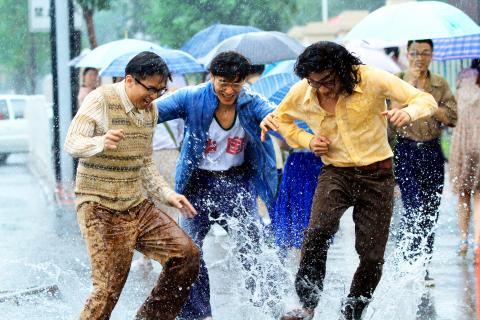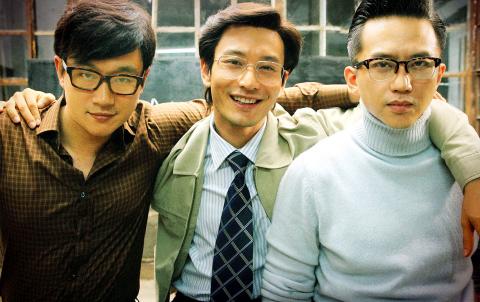After a string of historical action dramas, including The Warlords (投名狀) and Dragon (武俠), Hong Kong director Peter Chan Ho-sun (陳可辛) returns to his favorite theme, love and friendship, with American Dreams in China (海闊天空), an entertaining comedy-drama about three college friends who build a business empire over two decades. The connection of personal stories with society at large recalls Comrades, Almost a Love Story (甜蜜蜜), arguably Chan’s best work, which follows two Chinese whose search for a better life bring them first to Hong Kong and then the US.
However, while the 1996 work tastefully captures the life of the Chinese diaspora and the mood of Hong Kong on the eve of its handover to China, Chan’s latest dramatic offering is more of a cinematic testimony to the growing power of China, a nation now capable of running its own Hollywood and spreading its dogma, non-American style.
In 1980s China, amid sweeping economic reforms, country boy Cheng Dongqing (Huang Xiaoming, 黃曉明), carefree bohemian Wang Yang (Tong Dawei, 佟大為) and the ambitious Meng Xiaojun (Deng Chao, 鄧超) meet and become friends at a university in Beijing. Like their fellow students, who believe that America is their only hope for a better future, the trio prepare for visa interviews to pursue further studies in the US. But only Meng, whose grandfather and father had earned doctoral degrees in America, is able to take off for New York. He tells his friends that he has no intention of returning.

Photo courtesy of Applause Entertainment
Dismissed from his college teaching job and with his girlfriend Mei (supermodel Du Juan, 杜鵑) having left for the US, the disheartened Cheng, together with Wang, sets up New Dream, an English-language school, in an abandoned state-owned factory. Their lessons prove to be a huge hit among Chinese youth thirsting for anything that can help them pass the SAT and GRE exams.
Across the Pacific, Meng waits on tables to make ends meet. Dejected, he returns to China and joins in his old friends’ business venture. As the academy becomes a lucrative national franchise, the trio symbolizes a new generation of entrepreneurs that came of age in 1980s and 1990s China.
However, with success comes friction and dissent. Business divisions increase and alienate the three friends, eventually shattering their friendship. The film reaches its denouement as the three businessmen travel to the US to fight a lawsuit accusing them of intellectual property theft.

Photo courtesy of Applause Entertainment
Narratively speaking, the film tells an engaging, feel-good story about three buddies making it in the big city and embracing each other’s shortcomings in the face of power, money and fame. It plays well with the distinct character types, enjoyably fleshed out by the three Chinese leading thespians, who share sparkling on-screen chemistry. Tong’s romantic disposition makes him the most likeable, while Deng delivers a focused performance as an idealist with a defeated ego. As for Chinese heartthrob Huang, despite his brave move to play against his good looks, he fails to convince as the simple country boy morphing into a sharp businessman.
Iconic pop songs, including Taiwanese pioneering female rocker Julie Su’s (蘇芮) The Same Moonlight (一樣的月光), Greenhouse Girl (花房姑娘) by Chinese rock legend Cui Jian (崔健) and Hong Kong rockers Beyond’s Boundless Oceans Vast Skies (海闊天空), add atmospheric tone to the narration. The character’s lives and their rising fortunes are juxtaposed with important moments in Chinese contemporary history such as the 1999 bombing of the Chinese embassy and Beijing’s failed 2000 Olympic bid. Naturally, the 1989 Tiananmen Square Massacre isn’t mentioned — a calculated commercial omission that will ensure, Chan seems to think, success on the big screen.
In essence, American Dreams in China derives its stamina from a contemporary Zeitgeist: as China has grown to be an important player in world politics and the global economy, people are demanding that their erstwhile American dreams be redefined in Chinese terms. The China-US theme reaches a didactic height when Huang’ character gives a winning speech in front of their American plaintiffs, who are depicted as prejudiced and arrogant. At that moment it becomes blatantly clear that the success of the trio is never the result of American-style individualism, but a collective ideology that finds its roots in the grudges of China’s colonial past.

Photo courtesy of Applause Entertainment
Evidently, the message has been well received by its audience. The film reportedly raked in more than RMB500 million (NT$2.5 billion) in China in less than one month after it opened on May 17.

Photo courtesy of Applause Entertainment

This is the year that the demographic crisis will begin to impact people’s lives. This will create pressures on treatment and hiring of foreigners. Regardless of whatever technological breakthroughs happen, the real value will come from digesting and productively applying existing technologies in new and creative ways. INTRODUCING BASIC SERVICES BREAKDOWNS At some point soon, we will begin to witness a breakdown in basic services. Initially, it will be limited and sporadic, but the frequency and newsworthiness of the incidents will only continue to accelerate dramatically in the coming years. Here in central Taiwan, many basic services are severely understaffed, and

Jan. 5 to Jan. 11 Of the more than 3,000km of sugar railway that once criss-crossed central and southern Taiwan, just 16.1km remain in operation today. By the time Dafydd Fell began photographing the network in earnest in 1994, it was already well past its heyday. The system had been significantly cut back, leaving behind abandoned stations, rusting rolling stock and crumbling facilities. This reduction continued during the five years of his documentation, adding urgency to his task. As passenger services had already ceased by then, Fell had to wait for the sugarcane harvest season each year, which typically ran from

It is a soulful folk song, filled with feeling and history: A love-stricken young man tells God about his hopes and dreams of happiness. Generations of Uighurs, the Turkic ethnic minority in China’s Xinjiang region, have played it at parties and weddings. But today, if they download it, play it or share it online, they risk ending up in prison. Besh pede, a popular Uighur folk ballad, is among dozens of Uighur-language songs that have been deemed “problematic” by Xinjiang authorities, according to a recording of a meeting held by police and other local officials in the historic city of Kashgar in

It’s a good thing that 2025 is over. Yes, I fully expect we will look back on the year with nostalgia, once we have experienced this year and 2027. Traditionally at New Years much discourse is devoted to discussing what happened the previous year. Let’s have a look at what didn’t happen. Many bad things did not happen. The People’s Republic of China (PRC) did not attack Taiwan. We didn’t have a massive, destructive earthquake or drought. We didn’t have a major human pandemic. No widespread unemployment or other destructive social events. Nothing serious was done about Taiwan’s swelling birth rate catastrophe.